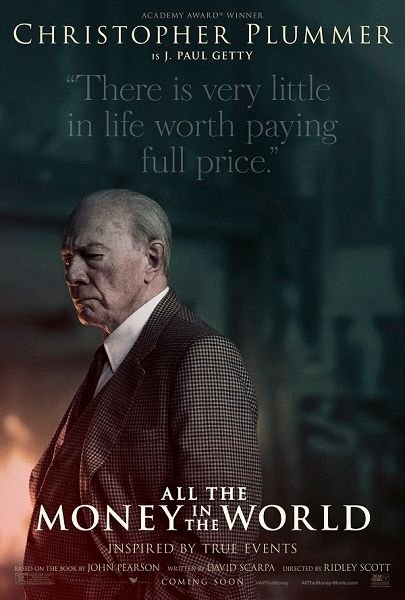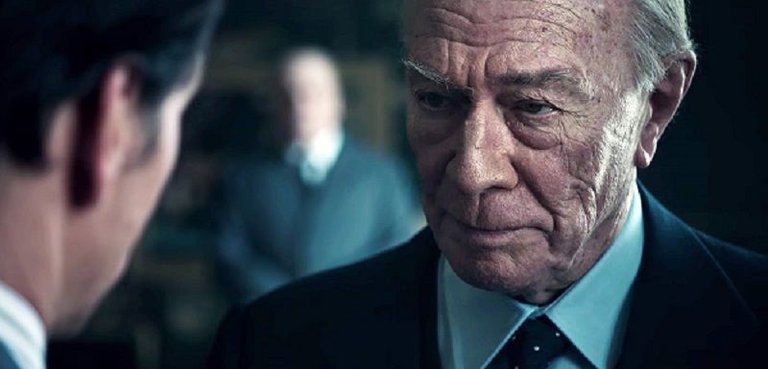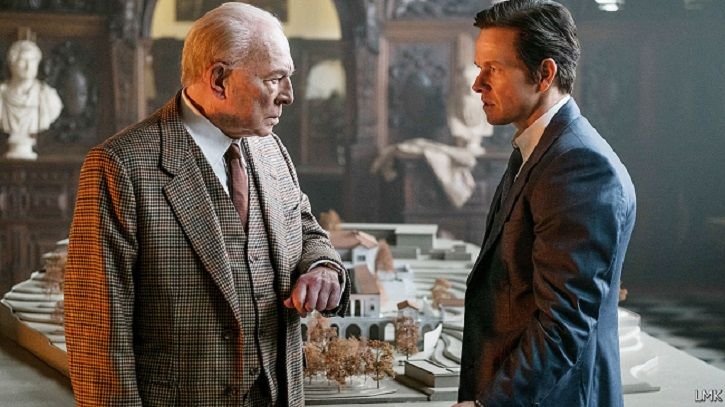After watching a two-hour documentary about the Getty family, I no longer think of Ridley Scott's movie as good as I first decided. The story of the oil magnate Jean Paul Getty (named in 1966 as the richest man in the world), his five sons, his five marriages, his 14 grandchild, deserves to make a whole series centered on key themes of our modern society such as obsession, money, power. Instead of making a grim epic, which definitely has real life material, Ridley Scott decides to shoot a thriller for kidnapping. It's not a coincidence that many people can diagnose the movie as ordinary. And the movie is definitely not good enough, considering what it could be, but for what it is - and this is a story about a kidnapping - I think the movie is really good.

The movie focused on just one of the important moments in Getty's life - the kidnapping of his 17-year-old grandson Jean Paul Getty III in 1973 in Rome. The film begins with a gorgeous tracking of the blonde hippie Getty, who walks through the streets of Rome, in a scene that deliberately worships Fellini's "La Dolce Vita". Perhaps if it were a film shot by Paul Thomas Anderson (an inevitable analogy with "There will be blood"), he would start with lavish footage from the Getty mansion in Surrey, England, where he spent the last years of his life. Perhaps it would be a movie in which Getty is the main character, and as such, we would be provoked by each scene to ask ourselves the question: Why is this man so confused? In the real life, Getty inherited the oil business of his rich father, but he leaves hardly any of the 10 million money he has at his disposal. He is raised by a strict mother. Does the lack of parental love have anything to do with the raw, maniacally cunning man in which he turns? Or, on the contrary, is it just a coincidence of circumstances, not the main culprit for his character? Alas, Ridley Scott's film does not ask questions about the genesis of the Getty monster. He is asking all the time for another action-oriented question: "Will the boy get out of the way?" Considering that this is a movie about real events, this question should not be very exciting. (Down there are spoilers, but they are moderate). If anyone prefers to know, he will soon realize that yes, the young Getty survives, and the only thing he is physically losing (at that particular moment) is one ear. And although the questions that Ridley poses are not from the existential scale of the questions he meets with "There will be blood", he manages to make a really dynamic and interesting film in which, though not in focus, there is no psychological depth. On the contrary, whether because of the great role played by Christopher Plummer or because of the really good dialogues and script, the character of Getty is deep enough, comprehensible and interesting, although the film is not really for him. I find this to be worthy of respect.

Speaking of movies about influential people with a lot of money whose family relationships are a failure, I can not help mentioning "Citizen Kane". Indeed, the real Kane, William Randolph Hurst, was also a collector of art and he and the Getty knew each other. Getty has visited him at least once in Castle Hurst, etc. The courage endeavors. Both were very much like each other: the only children inherited from their fathers family business and turned it into an empire. In the case of Hurst, these are the newspapers, Getty: Oil. Hearst also had 5 sons. Bearing in mind that "Citizen Kane" is one of the key American classics of the twentieth century (and Trump has declared his favorite film), it is not surprising that stories with similar charges are revived periodically. The plot of life of both men is dramatic and grandiose and has a parish character. Such stories are narrated both to entertain and admire (the achievement of the American dream) and to a warning, as is the case with another classic, the Great Gatsby.I like many things in "All the Money of the World". I like even the obvious dramatization around the character of Romain Durris, who is there to remind us that humanity occurs everywhere, even on the side of the kidnapper. Chungkuanta is a real person, although in reality he did not bring a doctor to cut Paul's ear. They were the guerrillas themselves, with some stupid metal, and they had watering them with brandy. By the way, I don't know if somebody has turned in on Christopher Plummer's praise, but Duryis does a very vital role. Every scene in which he is on the screen or negotiating with Gael Getty (Michelle Williams, again on the level) or communicating with Paul, his play is fascinatingly spirited. I like the tempo of the movie, I like the camera moving. All actors are in place. I love a lot of dialogues, I have a few favorite scenes, such as Jean Paul Getty's thoughts about money ("Every fool can get rich, but few are rich.") I like each character and nobody has been turned into a cliche. Even the work of Mark Wahlberg, the former CIA agent whose speech to Old Getty is a bit spontaneous, stands firmly on his feet and does not irritate with excessive fuss or sentimentality. Besides, I really like the scene of the prisoner's escape and the rapid fire in the field (also a fiction). John Pearson's biography for Paul Getty, on which the film is based, does not mention Paul being so close to his grandfather, as the movie produces. Jean Paul Getty has a genuine hatred of drugs, and Paul has been singled out in the Italian press as the "Golden Hippie." Little Paul has experimented with drugs, a defeat by his father, who was an opium addict, as well as featured in the film. The reason the father did not take part at the time of the kidnapping was that at that time his second wife, Talita, with whom they had struggled together in Morocco, died of a heroin overdose. Jean Paul Getty II is experiencing her death extremely severe, in absolute isolation. Interesting detail is that he, however, years later, manages to discard drugs and gives millions of his father's money to charity.

I will not list yet inconsistencies between the film and reality (though there are a lot) because it is not important. More interesting for me, why is Ridley Scott going to show this episode of the life of one of the most scandalous people in modern history, given that he could concentrate on other details. The funeral of Getty, for example, and the ensuing problems, have a serious dramatic burden and are worthy of filming. In reality, Getty wishes to be buried in the likeness of the Roman villa Getty House in Malibu, which fills with its collection statues and paintings. Because the museum is a museum, there are enormous problems for the body to be transported and buried there, and for months it is in oblivion, without a normal burial, under extremely bad conditions of high temperature and rapid decomposition. What irony! If it was a movie focused on the character of Getty, then we would probably see some of his love adventures (except for five wives). Jean Paul Getty has five sons, the last of whom, Timothy, dies at the frail age of a year and several months of a brain tumor. Getty did not take care of any of his children and communicated with them through short notes with which he only sent them money.
The reason why Ridley Scott does not include all of these details from Getty's extravagant life is that they don't care, and they don't help the story he wants to tell. He seems to be quite a pragmatic man and probably has subjugated the whole story of making a strained thriller. I think he has done quite well with this task, although it is definitely not the genre in which I would dramatize this story. If anyone accidentally wonders, Ridley's practicality extends to Kevin Spacey's quick acting decision to be replaced by Christopher Plummer. At the moment the Spacey scandals broke out, Ridley decided to film the movie despite the big losses he would suffer. "Otherwise, no one would watch this movie," he says, although he admits that Kevin Spacey has done a great role. At the beginning of the film, Paul Gety III voice behind the frame says, "I'm telling you all this in order to understand things, which you will see, and in the hope of forgiving us. We, the Getty family, are from another planet where gravity is so strong that it distorts the light. We look like you, but do not be confused: we are not like you. "And later Jean Paul Getty himself explained the meaning of this thought, saying that he was the reborn Emperor Adrian. "All the money in the world" is a story about a disproportionate, abnormal power, concentrated in the hands of a very frightened and confused person. As in his own eyes (or those of his family) he looks different, even alien, the truth is that a human emotion has been guided throughout his life, and has dictated his behavior leading to suffering for him and his loved ones : fear. Or, as Seneca says, whose immortal thoughts would be a worthy end to everything: "But life becomes infinite, indefinite - misery, if we always fear as much as we can."
Looks like an intense drama. Love the quote there is little in life worth paying a full price. Amazing
Thanks :)
Whenever i want to watch a movie what attract me most is the Title, i don't joke with that of course because i feel the movie would definitely be what it is titled. From the title of the movie on your post if you would ask me i would be very much interested in getting some views because its very catching and when it comes to money issues in movies you definitely expect the intensities. Thanks for the post..
I'm influenced by one shot of the movie and I can judge if the movie is good or bad by that. :D There are always mistakes of course but sometimes the title work too.
Thanks for the comment. :)
You re absolutely right
:)
Money is not everything, but everything needs money. Interesting post @godflesh
Thanks :)
interesting stories, sometimes a lot about the real story happenings that in the movie's many also invite sympathy with a life of luxury
True :)
Isn't the richest family the Rothschild family?
Wow, i love watching movies by their titles, i don't joke with that of course because i believed a movie would reflect exactly what its title says. For my candid opinion, i would be very much interested in having a view on the movie on your review post because i love the title. You know when money is involved then you have to expect intensity. Thanks very much for post.
Very good review.
Thank you :)
This post has received gratitude of 12.32 % from @appreciator thanks to: @godflesh.
thanks
hah is this right?